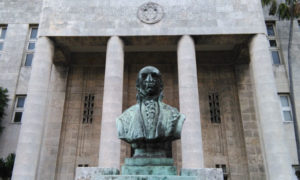
Two individuals in the late eighteen century were instrumental in shaping the intellectual climate of the island, Captain-General Don Luis de las Casas and Bishop Díaz de Espada. A truly enlightened ruler in both cultural and economic matters, las Casas was sent to Cuba as captain-general in 1790. After he acquired a sugar mill, his own interest became tied to those of the Creole planting class, in particular to the Creole planter and economist Arango y Parreño. The two men joined in founding in l792 the Sociedad Económica de Amigos del País (the Economic Society), a center of learning and discussion; the Junta de Fomento, an agricultural and development board; and the Papel Periódico, Cuba’s first newspaper.
The Sociedad Económica became the headquarters of a tightly organized and influential group of Creoles from Havana. In their meetings they discussed science and arts, culture and education, and commerce and industry. But their consuming interest was agriculture, especially sugar. They were instrumental in obtaining from Spain permission for the free and unlimited importation of slaves. When war broke out between Spain and France in 1793, they prevailed on las Casas to open Cuba’s ports to neutral and allied nations; the resulting purchase of Cuban sugar by the United States and England resulted in growing prosperity. The Sociedad also became the most influential advocate for significant changes in the landholding structure of the island. By 1815 the group had succeeded in convincing the Spanish government to permit the outright ownership of land previously held in usufruct, to sell crown lands, and to devote hardwood forests to agricultural production thus paving the way for the rapid expansion of the sugar industry.
The influence of the members of the Sociedad rested not in their numbers, which reached about two hundred, but on their economic power. The corruption and inefficiency of the Spanish bureaucracy in the island weakened royal control and made Spanish officials easy tools of the Creole planters. Particularly on the issue of slavery, Creoles, Peninsulars, and slave traders or negreros developed an uneasy alliance to preserve the institution and Spanish officials were therefore powerless to implement legislation on behalf of the slaves. In desperate need of capital for its depleted treasury, war-exhausted Spain also bowed to the demands of the Cuban planter to sell crown lands for sugar growing.









1 thought on “Sociedad Económica de Amigos del País”
PLEASE ADD ME TO YOUR MAILING LIST.
WOULD LIKE TO RECEIVE THIS PERIODICAL AND ACTIVITIES OF THIS ORGANIZATION.
THANKS
Carmen Sola-Llonch
Comments are closed.